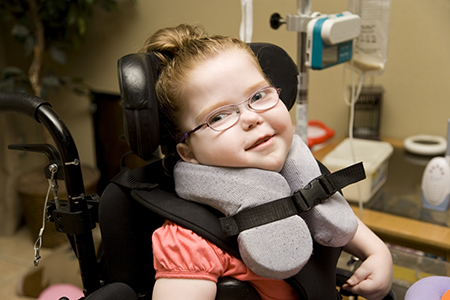What is an Intellectual Disability (ID)?
Intellectual disability (ID) is diagnosed when a child (under the age of 18) has significant limitations in two areas: intellectual functioning and adaptive behavior.
Intellectual functioning refers to a child’s mental capacity in the areas of learning, reasoning, and problem solving. One way to measure intellectual functioning is through an IQ test (intelligence quotient). The average IQ is around 100. In most cases, a child is considered intellectually disabled if he or she has an IQ of less than 70 to 75.
Adaptive behavior refers to the conceptual, social, and practical skills that are learned throughout childhood and are necessary for day-to-day living. Conceptual skills include an understanding of language and literacy, understanding numbers (including money and time) and self-direction. Social skills include interpersonal skills, the ability to follow rules, self-esteem and wariness (such as the ability to avoid being victimized). Practical skills include daily personal care, use of telephone and money, occupational skills, transportation and travel, and more.
Intellectual disability is believed to affect approximately 1% of the population. People with intellectual disabilities can – and do – learn new skills, but they learn them more slowly than people without such limitations. There are different degrees of intellectual disability, ranging from mild to profound.
What causes an Intellectual Disability?
Intellectual disability can result from anything that interferes with normal brain development. Doctors have found many causes of intellectual disabilities, however the specific cause is known in only 30% of cases. The most common known causes of intellectual disability are:
- Genetic conditions such as Down syndrome, fragile X syndrome and phenylketonuria.
- Problems during pregnancy that interfere with fetal brain development, such as alcohol or drug use, malnutrition, maternal infections and preeclampsia.
- Problems during childbirth that deprive a baby of oxygen during labor and birth, or if a baby is born extremely prematurely.
- Illness or injury during childhood that affect brain development. Diseases such as meningitis, whooping cough, or the measles can cause intellectual disability. Exposure to toxic substances such as lead, malnutrition, neglect or abuse, severe head injury or near-drowning may also cause intellectual disability in a growing child.
An intellectual disability is neither a disease nor a mental illness. Children with intellectual disabilities may take longer to learn to speak, walk, and learn the activities of daily living. They may have difficulty learning in school, and it will take them longer to achieve the milestones that come more easily to children without such limitations. However, with individualized support and treatment, most children with an intellectual disability can – and will – learn to do many things.
What are the signs of an Intellectual Disability?
There are many different signs of intellectual disability in children, and they often depend on the severity of the disability. With some children, signs may appear during infancy, or they may not be noticeable until a child is several years old. Some of the most common signs of intellectual disability include:
- Rolling over, sitting up, crawling, or walking later than expected
- Talking later than expected, or having difficulty talking
- Slow to achieve self-care milestones, such as potty training, dressing, and feeding himself or herself
- Inability to connect actions with consequences
- Behavioral problems, including explosive tantrums
- Difficulty with problem-solving or logical thinking
- Unusual difficulty remembering
Children with profound intellectual disability may have additional health problems, such as seizures, physical handicaps, and vision or hearing problems.
What are the treatment options?
The goal of treatment is to help develop the child’s potential to the fullest. With the right support and an individualized treatment plan, including special education and training, many children with intellectual disabilities will be able to live independently as adults. In approximately 85% of cases, the intellectual disability is mild. However, less emphasis is now placed on the degree of intellectual disability and more on the amount of intervention and support needed for daily life.
While children with intellectual disabilities may take longer to learn the activities of daily living, and while some children may never overcome certain limitations, these cherished members of society are more like others than they are different. Just like those without intellectual disabilities, they have many unique talents and gifts and should be encouraged to develop them.
For more information on intellectual disabilities, visit: The American Association on Intellectual and Developmental Disabilities, the National Dissemination Center for Children with Disabilities, Web MD, Medline Plus, and The Arc, which provided source information for this article.
Shield HealthCare | Medical Supplies For Care At Home Since 1957























